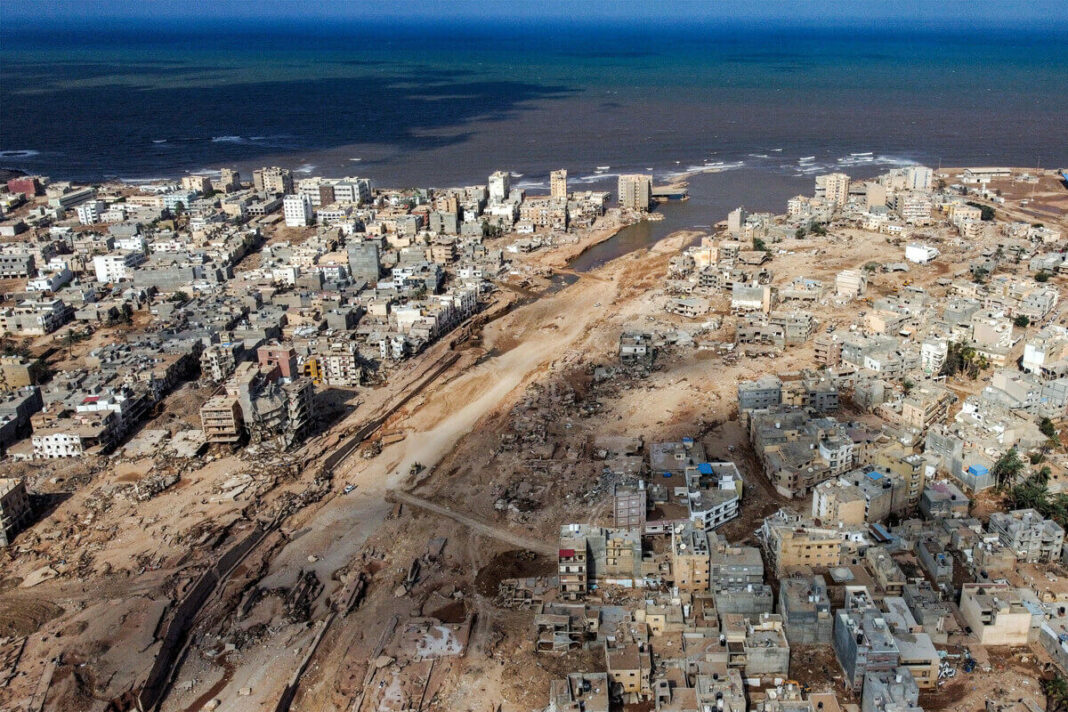Fatih Yurtsever*
The city of Derna, on the Mediterranean coast in eastern Libya, was hit by devastating floods on Sept. 10 after two dams burst, unable to withstand the torrential downpours unleashed by Storm Daniel. According to the Libyan Red Crescent, the death toll has soared to over 11,300, with more than 10,000 still missing. The city is facing a humanitarian crisis, with severe shortages of electricity, clean water and food. Libyan officials are deeply concerned about the risk of disease outbreaks due to the large number of bodies washed into the sea. In response to the floods, the Turkish Ministry of Foreign Affairs released a statement on Sept. 12 announcing Turkey’s assistance by deploying three cargo planes carrying humanitarian aid and search and rescue teams. The Turkish Navy also provided aid by sending two warships, TCG Sancaktar and TCG Bayraktar, along with additional supplies.
While Turkey’s efforts were acknowledged and valued, there were public queries about why TCG Anadolu LHD (landing helicopter dock), the Turkish Navy’s flagship and a proficient amphibious assault vessel, was not utilized during the operation. Egypt, which closely monitored the situation in Libya with Turkey, dispatched a Mistral Class helicopter carrier, similar to TCG Anadolu, for medical aid and to evacuate the injured. This raised further questions about why Turkey did not choose to use TCG Anadolu to transport aid and provide medical assistance.
This wasn’t the first time TCG Anadolu’s deployment was in question. On Feb. 6, after two devastating earthquakes caused an enormous loss of life in southeastern Turkey, the Anadolu was not dispatched to Iskenderun Bay for relief operations. At the time it was claimed that the ship was not ready for operation because the sea acceptance tests had not yet been completed and thus it could not be assigned for disaster relief operations.
As per navy procedures, TCG Anadolu must complete its acceptance tests before being commissioned into the Turkish Navy. The sea acceptance test for TCG Anadolu commenced in June 2022. Ordinarily, for a complex amphibious assault ship like TCG Anadolu, equipped with complex sensors, units and weapons, the testing process should take at least a year.
However, in order for the ship to be used in propaganda activities before the presidential and parliamentary elections of May 14, the sea acceptance tests were conducted within a shortened timeframe of just seven months, which suggests that not all tests were completed, with TCG Anadolu delivered to the Turkish Naval Forces Command in a ceremony held on April 10. The hasty handover of TCG Anadolu to the navy before all its subsystems, weapons and sensors were fully tested and before the completion of sea acceptance tests can be attributed to Turkish President Recep Tayyip Erdoğan’s electoral strategy rather than military necessity.
Anadolu made port visits to İstanbul and İzmir and was opened to the public to secure public support for Erdoğan before the elections. As a result of the intensive promotion and propaganda activities carried out by the Presidential Communications Directorate, many citizens visited the ship in İstanbul and Izmir ahead of the elections.
Under normal circumstances, being open to the public before elections and serving as a propaganda tool for the current government is not the ship’s role. When the TCG Anadolu project was initiated, the prevailing viewpoint at Naval Forces headquarters was that the ship would primarily be utilized for amphibious operations, serving as a command ship and a platform for commanding and controlling naval operations. Additionally, it was intended to be employed in humanitarian assistance and disaster relief operations, representing Turkey’s soft power on the international stage.
Soft power is a state’s ability to influence other states’ behavior through persuasion and attraction rather than coercion or force. It is often described as the ability to “get others to want what you want.” Navies play a pivotal role in a nation’s soft power strategy. They can demonstrate a state’s military and economic capabilities and promote its values and culture. Navies can also provide humanitarian assistance and disaster relief, which can help build goodwill and trust with other states.
In 2011 the United States Navy initiated Operation Tomodachi, a mission focused on providing humanitarian aid and relief to Japan in response to a devastating earthquake and tsunami. The operation involved deploying 24 ships and three air wings, which provided critical support to the Japanese government and its people. Operation Tomodachi’s success is an exemplary model of the United States Navy’s ability to project soft power. Similarly, the Chinese Navy’s “Peace Ark” hospital ship has also been deployed on numerous humanitarian missions worldwide, providing medical assistance to thousands of people in need. The mission has helped those requiring help and enhanced China’s image as a benevolent and responsible global power.
Turkey could have demonstrated its soft power and gained the sympathy of the Libyan people in political turmoil by sending the TCG Anadolu to Libya. In an attempt to influence Libya’s future, Turkey has chosen to support the Government of National Accord (GNA), which controls western Libya and the capital, Tripoli, politically and militarily. However, to have a lasting impact on Libya’s future, Turkey needs to gain the support of the entire nation, rather than just one side. The TCG Anadolu presented a prime opportunity for Turkey to showcase its soft power elements, but the Erdoğan administration’s purge of 90 percent of the Navy’s staff officers on the pretext of the coup attempt on July 15, 2016, coupled with changes in the promotion system and the advancement of officers who would work in harmony with the Erdoğan administration, have severely impacted the Navy’s planning and operational capabilities. Turkey’s ability to leverage its naval power and soft power elements to influence its area of interest has been considerably reduced under the Erdoğan administration.
* Fatih Yurtsever is a former naval officer in the Turkish Armed Forces. He is using a pseudonym out of security concerns.



